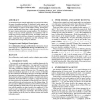Free Online Productivity Tools
i2Speak
i2Symbol
i2OCR
iTex2Img
iWeb2Print
iWeb2Shot
i2Type
iPdf2Split
iPdf2Merge
i2Bopomofo
i2Arabic
i2Style
i2Image
i2PDF
iLatex2Rtf
Sci2ools
112
click to vote
WWW
2005
ACM
2005
ACM
Adaptive query routing in peer web search
An unstructured peer network application was proposed to address the query forwarding problem of distributed search engines and scalability limitations of centralized search engines. Here we present novel techniques to improve local adaptive routing, showing they perform significantly better than a simple learning scheme driven by query response interactions among neighbors. We validate prototypes of our peer network application via simulations with 500 model users based on actual Web crawls. We finally compare the quality of the results with those obtained by centralized search engines, suggesting that our application can draw advantages from the context and coverage of the peer collective. Categories and Subject Descriptors H.3.3 [Information Storage and Retrieval]: Information Search and Retrieval; H.3.4 [Information Storage and Retrieval]: Systems and Software--Distributed systems, information networks, performance evaluation (efficiency and effectiveness) Keywords Peer collaborat...
Centralized Search Engines | Internet Technology | Peer Network Application | Unstructured Peer Network | WWW 2005 |
Related Content
| Added | 22 Nov 2009 |
| Updated | 22 Nov 2009 |
| Type | Conference |
| Year | 2005 |
| Where | WWW |
| Authors | Le-Shin Wu, Ruj Akavipat, Filippo Menczer |
Comments (0)

